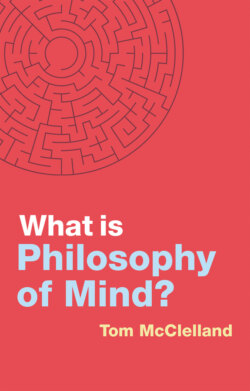Читать книгу What is Philosophy of Mind? - Tom McClelland - Страница 12
1.4.2 The Knowledge Question
ОглавлениеMetaphysics asks about the nature of reality and the Mind and Matter Question is a central question in the metaphysics of mind. The Knowledge Question, by contrast, is an epistemological question about our knowledge of mental states: how do I know what’s going on in my own mind or in the minds of others? The first thing to notice is that the way you know about your own mind is quite different to the way you know about other minds. You can only know about Mindy’s muscle pain from its outward signs – things like her facial expression or her verbal reports – but she knows about her muscle pain from the inside. There’s thus an epistemic asymmetry between knowledge of one’s own mind and knowledge of other minds.
It’s tempting to say that we know our own minds via a kind of inner sense. Just as Mindy knows what’s going on around her through perception, she knows what’s going on in her own mind through introspection. But what is this introspection and how does it work? We can also ask about how secure our self-knowledge is. Can you think you are in a mental state but be wrong? Perhaps Mindy can misidentify her nervousness as excitement, but it’s harder to make sense of her being wrong that she’s in pain. Can you be in a mental state without knowing that you are? We can make sense of Mindy having memories she doesn’t know about, but it’s harder to make sense of her failing to know that she’s in pain.
What about our knowledge of other minds? Our knowledge of other minds seems less secure. Mindy knows her own intentions quite clearly but has a much harder time working out which way the goalkeeper intends to dive. Does she learn about the goalkeeper’s mind by perceiving her behaviour, by imagining her point of view, or by some combination of the two? If the goalkeeper acts like she wants to win the game, how does Mindy know she’s not just pretending to have this desire? If the goalkeeper reports liking the smell of old socks, how does Mindy know that socks smell the same way to the goalkeeper as they do to her? Can we ever really know what’s going on in the goalkeeper’s mind or are we effectively just guessing? Could brain scans and advanced psychological investigation give us more direct access to the goalkeeper’s mind, or are her mental states always hidden from us? How confident can we be that the goalkeeper even has a mind?
These epistemological questions are bound up with the metaphysical questions discussed earlier. If the mind is a material thing, then we need an account of how we know about our brain states and the brain states of others. If, on the other hand, the mind is immaterial, we need an account of how we can gain knowledge of these special non-physical states. These epistemological questions also have deep practical and ethical implications. When is it wrong to doubt someone’s report of what’s going on in their mind? Is it ever right to think that you know what someone wants better than they do? Can a juror ever really know that the accused intended to kill? Can a probation officer ever really know that a murderer doesn’t desire to kill again? Our answers to these more concrete epistemological questions will be shaped by our answer to the Knowledge Question.
